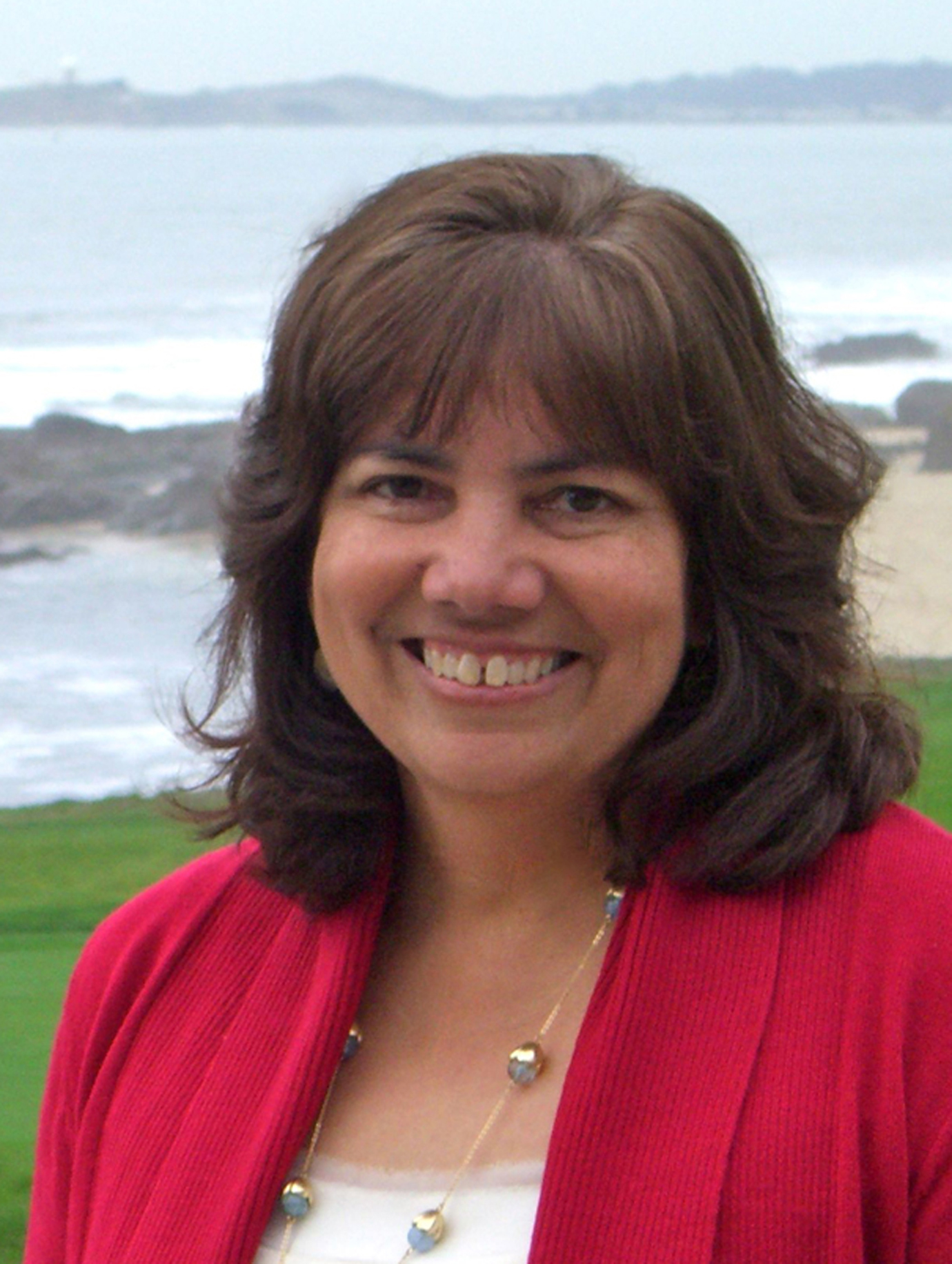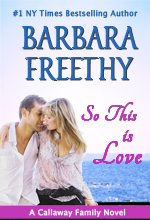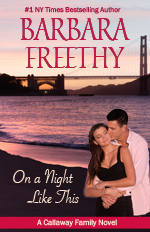In the next interview in our series on self-publishing, we talk to Barbara Freethy - a writer who has made a successful career out of both traditional and self-publishing.

Have you always felt driven to write? Are there are specific authors or books that you find particularly inspiring?
I came to writing from reading. I grew up in a house that was filled with books. I was the only girl in an all boy neighbourhood, and I spent many, many hours on my own wrapped up in the pages of a good story. In college, I studied English and creative writing, and in my early twenties, I started writing a novel. That first book was eventually sold to Harlequin/Silhouette Romance and was titled Promise of Marriage.
For those who are unfamiliar, can you tell us about your books?
My books range from contemporary romance to romantic suspense and women's fiction. I love to mix romance with mystery and even a touch of magic. All my books usually have a strong emotional core as well. I love to write about ordinary people caught up in extraordinary moments.
Can you tell us anything about your upcoming projects?
I'm currently finishing up Falling For A Stranger, the third book in my new romantic family series called The Callaways. The first two books, On A Night Like This (#1) and So This Is Love (#2) are currently available. Book #4 will be out in the fall. The stories feature each of the eight siblings in the Callaway family, many of whom are San Francisco firefighters, and each of the siblings was raised with the Callaway tradition of "serve and protect".
When do you find time to write? Does this differ from when you started writing your first novel?
I've been writing for twenty years now, so I have written through many different periods of my life. I started writing when I was pregnant, so I wrote many books while I had very small children. I also on occasion held down a second job to keep the money coming in. I didn't have the luxury of being a full-time writer until a few years ago.
You found success by going down the traditional publishing route first. What made you decide to self-publish?
I started self-publishing some of my backlist titles, which were books that were originally traditionally published - however, the rights on those books had been returned to me. When I got involved in self-publishing, I fell in love with the process. I like being in charge of my career and being able to bring books out more frequently. I like setting my own prices, designing my covers, and writing what my readers want to read. While there are certainly benefits to traditional publishing, for me publishing my own books has been a phenomenal and amazing dream. In two years, I've sold over 3 million eBooks on my own! It's been exhausting but wonderfully fulfilling. I've moved on from backlist to frontlist books and have self-published 5 eBook original titles as well as my older books.

Whilst self-publishing your backlist, did you continue writing new material and traditionally publishing it? Or did you start self-publishing your new material? If so, why?
I am currently focused only on self-publishing. My traditional publisher did not make me an offer that compared with what I was making on my own, so I decided to self-publish my new books. Three of the five original titles have spent time on the USA Today Bestseller List, so they've done not only as well as my traditionally published books, but they've done better.
How did you feel when you made the bestseller lists?
Two years ago I had never hit the NY Times and then my first self-published title Summer Secrets hit #1 on the NYT. It was the most amazing feeling and unreal experience of my life, especially since I had hit the coveted spot completely on my own. Since that date in July of 2011, I have had 13 other titles hit the New York Times. One of my romantic suspense novels, Don’t Say A Word has been on the NYT List for 5 out of the last 6 weeks. But while bestseller lists are great, what really makes me happy is knowing that more and more readers are discovering my books.
What do you think the greatest advantage of self-publishing is?
There is no one in the publishing world that cares more about your book than you do. So you're already emotionally invested in finding success. You're not one of many authors at a big or even small publisher. You can focus and build your individual brand. You can write as frequently as you want to. You can lower prices, run giveaways, change covers, and tie in your promotions with your social media. There are no barriers to success in self publishing. The sky is the limit!
On the other hand, is there anything you feel self-published authors may miss out on? Such as the editor-author relationship.
I've worked with many wonderful editors in traditional publishing, and that can certainly be a creative and nurturing relationship. However, I have also found some pretty wonderful editors who are freelancing for self-publishing authors as well. There are lots of reasons an author might choose traditional publishing and probably the biggest one is the ability to do large-scale print distribution. However, in terms of other things like marketing, it doesn’t matter whether an author is self-published or traditionally published - they will be the primary person in charge of marketing their books unless they are at the very, very top of the publishing house. Then they may get a little help.
Do you feel there is more of a sense of community with self-publishing than there is with traditional publishing? Do you feel you have a stronger connection with your fans because you self-published?
I do think self-publishing has put me more in touch with my readers but that's also because I am publishing more frequently now so the readers don't forget about me in between books. We have more of an on-going relationship. I do think that traditionally published authors can also have the same great relationship with their fans.
Can you tell us more about your Street Team Facebook group?
The Street Team Facebook Group is a place for my dedicated fans to talk about my books, ask me questions and get some early sneak peeks at my upcoming books. In return, they help spread the word about my releases on their social media sites and to their friends.

How important is marketing yourself in the early stages of your self-publishing career? Any tips?
I actually think the first priority for a writer is the book. You have to produce a quality product. If you don't have a good book, nothing else will matter. I advise writers to write that first book, and then during the polishing/editing phase start setting up your social media sites and promotional plans. Early in your career, the most important thing you can do is to keep writing books. It is much easier to promote and sell the second, third, or fourth book than the first one. Once you start to build a book list, the audience base begins to grow as well and marketing efforts can have a bigger result.
Did you design your own cover? How important do you think cover design is to a potential reader?
I have designed many of my own covers. I took some classes in Photoshop to help. I have also worked with some cover artists as well. The cover is very important, so the author should make sure they have something that is easy to see in a thumbnail and clearly delineates their tone and type of story.
Finally, do you have any advice for writers looking to self-publish?
My best advice was given above and that's to write more than one book. Think of writing as a career rather. Research the opportunities available to you and your genre and make good decisions based on getting excellent information. There are many companies who take advantage of new, inexperienced authors. Make sure you know what you're paying for and what kind of contract you're signing. Join an author's group, either in your area, or online, and you'll be able to share with other writers and learn lots of valuable information. Writing and publishing is not for the faint-hearted. There are many challenges and obstacles whether you traditionally publish or self-publish your work. Everyone will have an opinion about your book, but you can't think about that when you're writing. You just have to focus on the book. That's where the magic begins!
If you would like to find out more about Barbara Freethy and her books, take a look at her website and follow her on Twitter here.
Comments